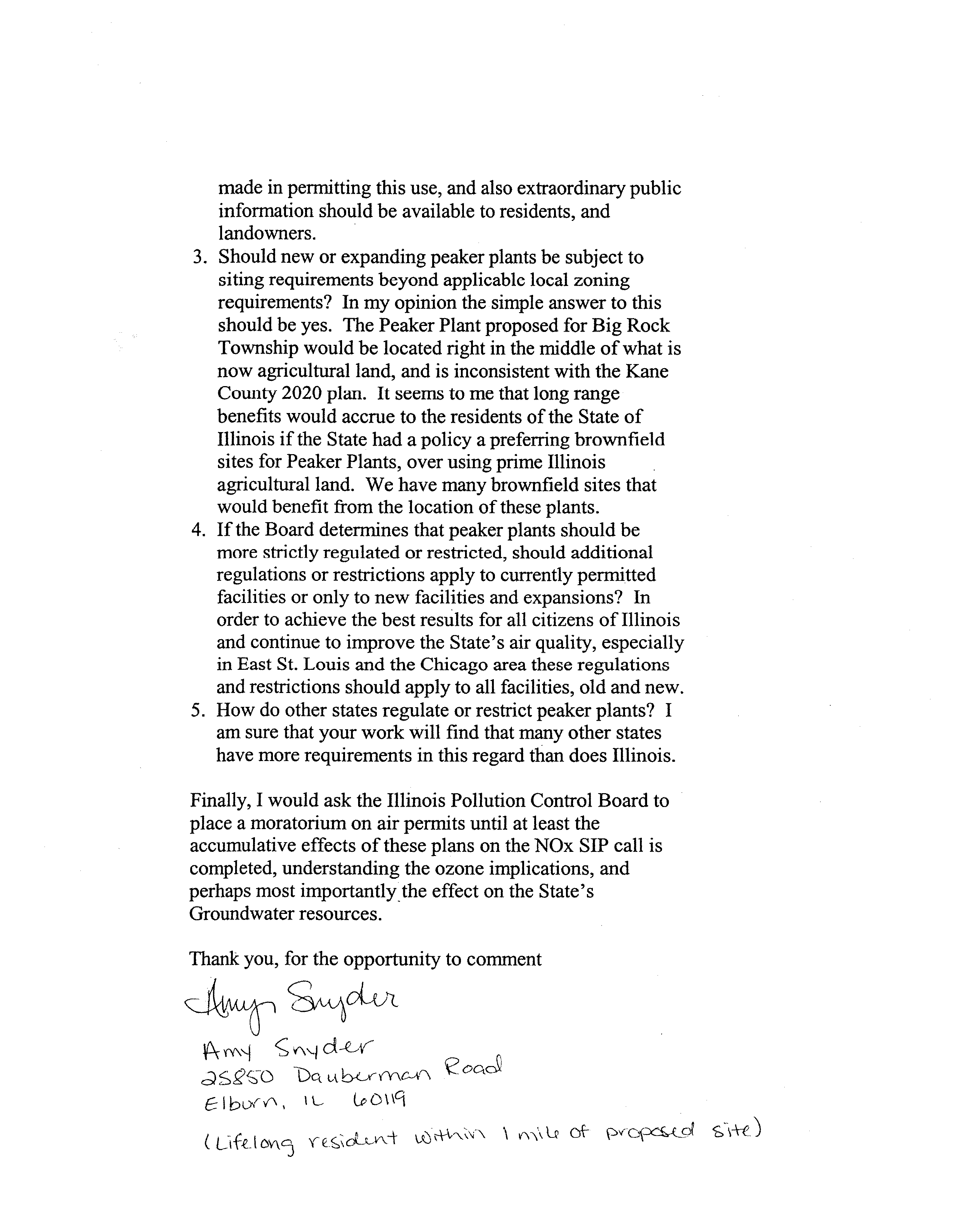RECEIVED
CLERK’S
OFFICE
OCT
2 62000
STATE OF ~WNOIS
Dorothy Gunn, Clerk
Pollution Control Board
Illinois Pollution Control Board
100 W. Randolph, Suite 11-500
~
/~5
Chicago, Illinois 60601
~#
~:7
Ms. Gunn,
I am writing to comment on the matter of the Natural Gas-
Fired, Peak-Load Electrical Power Generating Facilities, and
Docket Number ROl-lO.
On July
6th,
2000 Governor Ryan
requested the Illinois Pollution Control Board to conduct
inquiry hearings, and provide the Governor the Board’s
findings ofthe Board’s deliberations. I would like to comment,
as an individual citizen, to the Governor’s questions.
1.
Do peaker plants need to be regulated more strictly than
Illinois’ current air quality statutes and regulations
provide?
The simple answer to this question is yes.
It is
myunderstanding that at the present time the State of
Illinois has received applications to approve over 60
differentpeaker plant proposals, a majority ofthose in
the Chicago Metropolitan
area.
As you know the State of
Illinois needs to develop a NOx SIP plan, and the
accumulative impact of these plants needs to be
considered on the air quality ofthe Chicago metropolitan
area, and this can not be accomplished by look at permits
one at a time.
In addition the Chicago area is an ozone
non-attainment area, and this also needs to be considered.
2.
Do peaker plants pose a unique threat, or a greater threat
than other types of State-regulated facilities, with respect
to air pollution, noise pollution, or groundwater or
surface water pollution?
With respect to groundwater I
believe the answer is clearly, yes.
Depending on the type
ofpeaker plant, groundwater can be a major issue.
In my
township, Big Rock, a Peaker Power Plant is proposed
that would use groundwater as its’ source ofwater.
Big
Rock Township does not have any public water supplies
and all residents depend on groundwater.
It seems to me
that in those circumstances extraordinary care should be
made in permitting this use,
and
also extraordinary public
information should be available to residents, and
landowners.
3.
Shouldnew or expanding peaker plants be subject to
siting requirements beyond applicable local zoning
requirements?
In my opinion the simple answer to this
should be yes.
The Peaker Plant proposed for Big Rock
Township would be located right in the middle ofwhat is
now agricultural land, and is inconsistent with the Kane
County
2020
plan.
It seems to me that long range
benefits would accrue to the residents ofthe State of
Illinois if the State had a policy a preferring brownfield
sites for Peaker Plants, over using prime Illinois
agricultural land.
We have many brownfield sites that
would benefit from the location of these plants.
4.
Ifthe Board determines that peaker plants should be
more strictly regulated or restricted, should additional
regulations or restrictions apply to currently permitted
facilities or only to new facilities and expansions?
In
order to
achieve the best results for all citizens ofIllinois
and continue to improve the State’s air quality, especially
in East St. Louis
and
the Chicago area these regulations
and restrictions should apply to all
facilities, old and new.
5.
How do other states regulate orrestrict peaker plants?
I
am sure that your work will find that many other states
have more requirements in this regard than does Illinois.
Finally, I would ask the Illinois Pollution Control Board to
place a moratorium on air permits until at least the
accumulative effects ofthese plans on the NOx SIP call is
completed, understanding the ozone implications, and
perhaps most importantly the effect on the State’s
Groundwater resources.
Thank you, for the opportunity to comment
c~
~U
~
(L~f~to~
~
~


